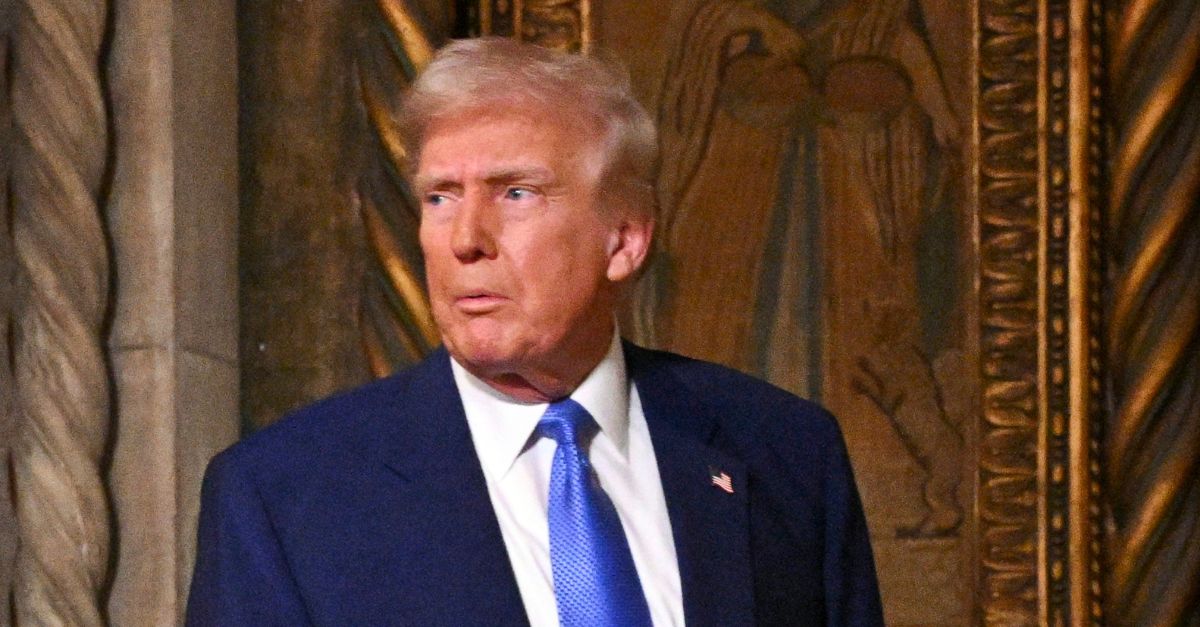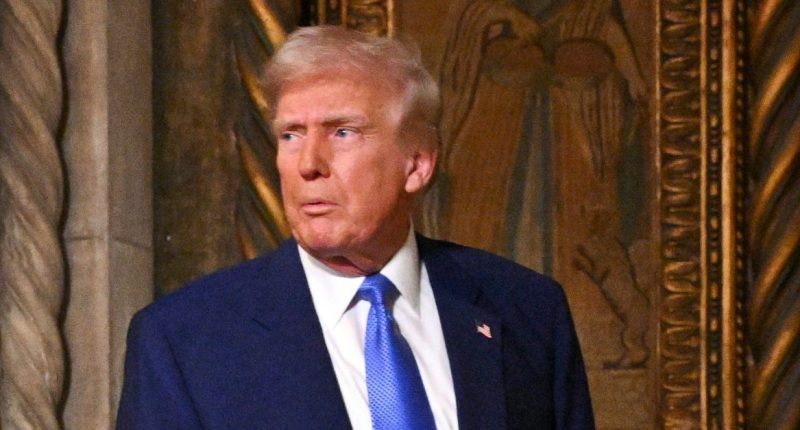
President Donald Trump departs after speaking at Mar-a-Lago in Palm Beach, Fla., Tuesday, Feb. 18, 2025 (Pool via AP).
A membership organization that won a nationwide injunction against an executive order targeting “diversity, equity, and inclusion” (DEI) initiatives wants a federal judge to stick to his guns.
In late January, President Donald Trump signed executive orders attempting to root out DEI from federal government contracts and barring government contractors with DEI programs of their own. Additionally, Trump directed the U.S. Attorney General to “deter” such “programs or principles” and to consider launching “civil compliance” investigations to effectuate such deterrence.
On Feb. 21, U.S. District Judge Adam B. Abelson, a Joe Biden appointee, issued a preliminary nationwide injunction against each of the three anti-DEI directives, finding they “abridge the freedom of speech” and are “unconstitutionally vague on their face.”
On Feb. 25, the government filed a motion to stay the court’s order pending appeal along with a memorandum arguing the injunction “intrudes on the Executive’s authority to enforce the law.”
On Thursday, the plaintiffs, led by the National Association of Diversity Officers in Higher Education, replied to the government’s motion, saying the defendants “have not identified any errors” in the judge’s opinion or offered “any reason for the court to reverse its position.”
The plaintiffs say precedent in the Maryland federal court system is on their side — citing a case that stands for the proposition that “modification of an existing preliminary injunction is proper only when there has been a change of circumstances between the entry of the injunction and the filing of the motion that would render the continuance of the injunction in its original form inequitable.”
The plaintiffs also cite controlling precedent in the Fourth Circuit Court of Appeals — which includes Maryland — which says a party moving to alter an injunction should be expected to provide “some evidence or statistics relevant to the effects of the order was not available at the time the trial judge made his or her decision.”
“Defendants have not identified any such ‘evidence or statistics relevant to the effects of the order;’ they have not even tried to do so,” the reply reads. “This Court balanced the equities and correctly found it necessary to preliminarily enjoin enforcement. Defendants have not identified any basis to suggest the Court of Appeals would find this Court’s decision was an abuse of discretion. This Court’s decision to grant the preliminary injunction was correct when initially entered, remains correct now, and should remain in effect.”
In his order, Abelson said the enjoined provisions violate the Fifth Amendment‘s prohibition on unconstitutionally vague laws and are also in violation of the First Amendment‘s guarantee of free speech.
More Law&Crime coverage: ‘Unclear on the current record’: Judge allows labor unions to depose Trump admin officials about ‘opaque’ DOGE staff and activities, says government brought it on themselves
The government’s latest response offers no new arguments directly addressing those constitutional claims, the plaintiffs note.
“Defendants make little effort to carry their burden here: they do nothing more than point this Court to the arguments raised in their Opposition to Plaintiffs’ Motion, which this Court already rejected in its comprehensive, thorough, and well-reasoned Memorandum Opinion assessing Plaintiffs’ claims and their likelihood of success on the merits,” the memo in opposition to the motion to stay reads.
In terms of merits arguments, the plaintiffs insist the government has offered nothing new for the court to even consider here.
“Moving parties must make a strong showing that they are likely to succeed on the merits to justify a stay,” the reply argues. “It is not sufficient to make ‘precisely those’ arguments for the stay that failed on the merits of the preliminary injunction.”
The government did, however, offer a new argument in terms of the harm they claim they are likely to suffer should the injunction remain in effect. They say the court’s order “improperly intrudes on intra-executive policy implementation” with federal agencies as well as Trump’s “stated priority of enforcing the anti-discrimination laws consistent with those agencies’ legal authority.” All this, the government claims, goes against the “public interest.”
The plaintiffs rubbish this argument as unpersuasive, at length:
The “core problem” is that the challenged provisions violate “core constitutional protections,” and therefore the preliminary injunction cannot be said to harm Defendants. The challenged provisions manifest this administration’s commitment to restricting, if not silencing, individuals and institutions whose viewpoints do not align with its political beliefs. That is a “blatant” and “egregious” brand of content discrimination that is unequivocally unconstitutional. Nevertheless, Defendants claim injury will befall them if they are not permitted to enforce such patently unconstitutional restrictions. Not so. While the President wields “supervisory and policy responsibilities of utmost discretion and sensitivity,” the President is still bound by “the general provisions of the Constitution.” The Executive’s duty is to “take Care that the Laws be faithfully executed.” But this duty does not extend to enforcing laws that are unconstitutional. There can be no improper impediment or injury to the Executive’s authority where the actions exceed its constitutional authority.
“Because Defendants cannot show harm, they attempt to conflate their purported injury with the public interest,” the reply goes on. “Without merit, they imply that enforcement of the unconstitutional provisions is in the public interest. However, ‘it is always in the public interest for unconstitutional laws to be prohibited from future enforcement.””
Love true crime? Sign up for our newsletter, The Law&Crime Docket, to get the latest real-life crime stories delivered right to your inbox.
And, the plaintiffs say, the court previously rejected the defendants’ efforts to show the public had any interest in the anti-DEI orders.
“Defendants failed to explain how the ‘government’s interest in immediately imposing a new, not-yet promulgated interpretation of what it considers “eradicating discrimination” outweighs the merits of Plaintiffs’ claims and irreparable harm they are suffering’” the reply continues, in a footnote. “Defendants have not even attempted to do so in their motion for a stay.”






